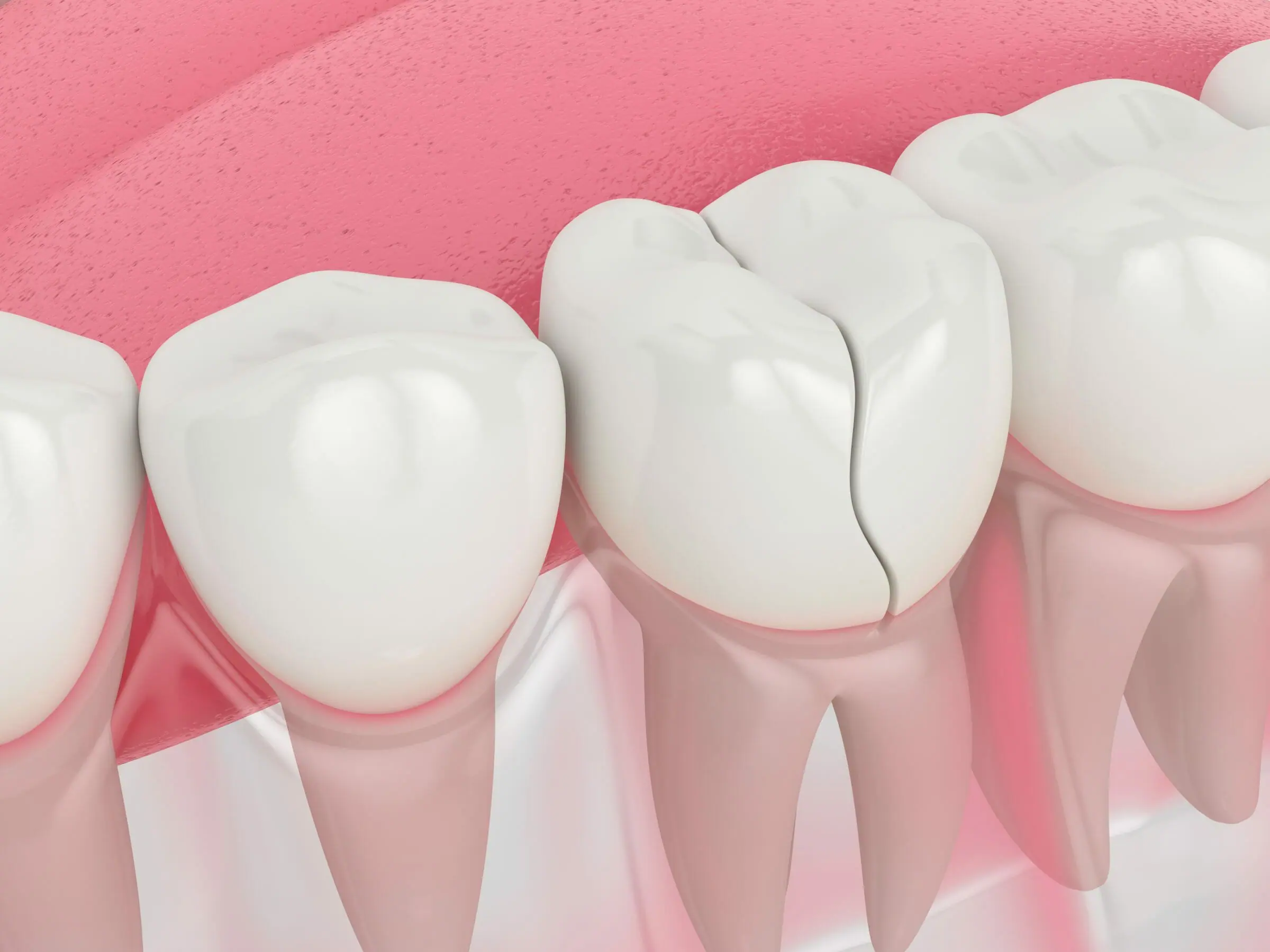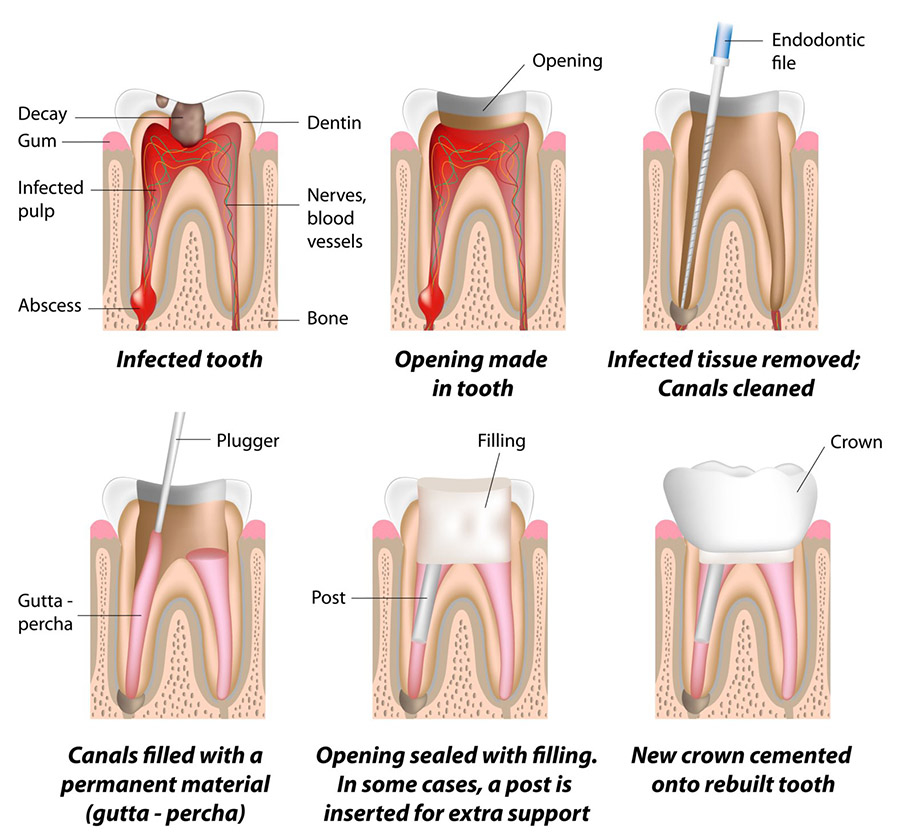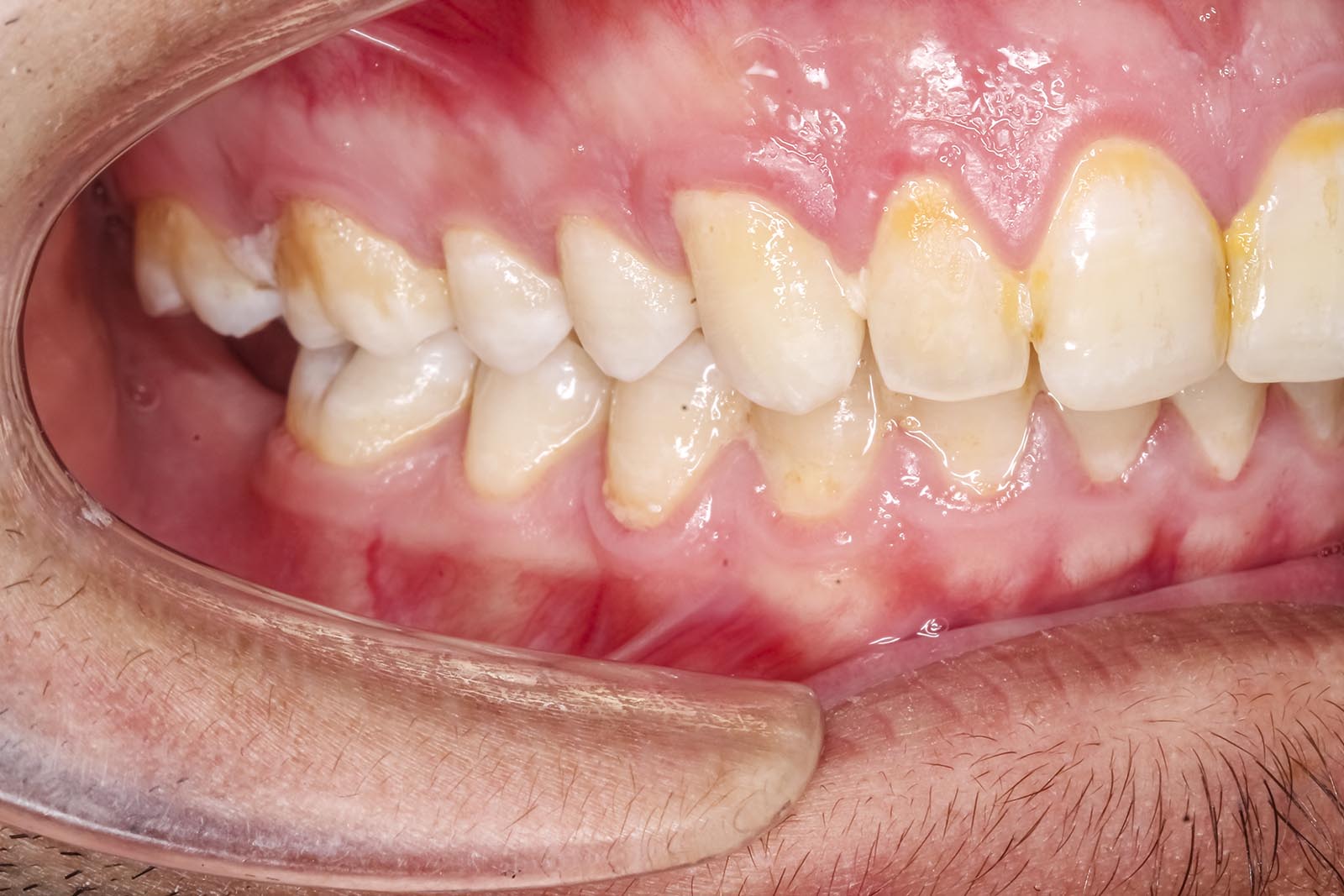Sensitive teeth are a common dental issue that affects many people worldwide, causing discomfort or pain when exposed to certain stimuli, such as hot, cold, sweet, or acidic foods and drinks.
This condition can impact your quality of life, but understanding its causes and available treatments can help you manage the symptoms and prevent further dental complications.
What Causes Sensitive Teeth?
Sensitive teeth, also known as dentin hypersensitivity, occur when the underlying layer of your teeth, called dentin, becomes exposed.
Dentin contains microscopic tubules (small canals) that lead directly to the tooth’s nerve centre. Under normal conditions, this layer is protected by the tooth’s outer enamel or the gums around the tooth.
However, when this protective layer is compromised, these tiny tubules become exposed. When hot, cold, sweet, or acidic substances come into contact with the exposed dentin, they can stimulate the nerve endings inside the tooth, causing sharp, sudden pain.
Sensitivity can range from mild discomfort to severe pain, depending on the extent of the exposure.
Enamel Erosion
Tooth enamel, the hard outermost layer of the tooth, serves as a protective shield for the dentin beneath it. Enamel erosion is one of the most common causes of tooth sensitivity.
Over time, this enamel can wear down due to a variety of factors.
For instance, brushing your teeth too hard or using a toothbrush with hard bristles can gradually wear away enamel. Additionally, using abrasive toothpaste, particularly those marketed as whitening or deep cleaning, may contribute to enamel loss.
Dietary habits, such as frequently consuming acidic foods and drinks (like citrus fruits, coffee, soda, or wine), can also erode enamel.
Furthermore, teeth grinding or clenching (a condition known as bruxism) puts added pressure on the enamel, wearing it down over time.
As enamel wears away, the dentin underneath becomes exposed, leading to sensitivity when the tooth is subjected to external stimuli.
Gum Recession
Gum recession is another significant cause of tooth sensitivity. Healthy gums cover and protect the roots of your teeth, which don’t have enamel.
However, due to gum disease (periodontitis), aggressive brushing, or age, the gums can begin to pull away from the teeth, exposing the more vulnerable root surface.
Since the roots lack the enamel protection that crowns the tooth, they are much more sensitive to temperature changes, pressure, and certain foods.
In cases of severe gum recession, this sensitivity can become quite pronounced, making even basic tasks like brushing and eating painful.
Tooth Decay
Tooth decay, often manifesting as cavities, cracks, or other forms of damage, can expose the dentin layer to external stimuli.
Cavities caused by bacterial activity create holes in the enamel, allowing hot, cold, sweet, or acidic substances to reach the dentin and irritate the tooth’s nerves. Similarly, any cracks or fractures in the teeth, whether caused by trauma, chewing on hard objects, or wear and tear, can provide a direct path for stimuli to reach the nerve endings inside the tooth.
If left untreated, tooth decay can progress and worsen sensitivity, sometimes requiring more intensive treatments like fillings or crowns to repair the damage and restore tooth protection.
Recent Dental Procedures
It’s not uncommon to experience temporary tooth sensitivity following certain dental procedures.
Treatments like dental fillings, crowns, or teeth whitening can make teeth more sensitive as they adjust to the changes. For example, teeth whitening involves the use of strong bleaching agents that can temporarily irritate the dentin or make it more reactive to temperature changes.
Similarly, dental restorations such as fillings and crowns can cause temporary irritation, especially if they affect the deeper layers of the tooth. This type of sensitivity often fades within a few days to weeks, but it can be managed with desensitizing toothpaste or fluoride treatments in the meantime.
Cracked or Damaged Teeth

Teeth that are cracked or damaged can be a direct cause of tooth sensitivity.
A crack in the tooth can expose the inner layers of dentin, allowing food particles, temperature changes, and even bacteria to reach the nerve centre. Even small cracks, invisible to the naked eye, can cause significant discomfort. Additionally, chipped teeth or those weakened by previous damage may have areas of exposed dentin, making them more susceptible to sensitivity.
If a crack extends deeper into the tooth and affects the pulp (the innermost part of the tooth containing nerves and blood vessels), it can result in even more severe pain, requiring immediate dental attention.
Symptoms of Sensitive Teeth
If you have sensitive teeth, you may experience the following symptoms:
- A sharp, sudden pain when consuming hot, cold, sweet, or acidic foods and beverages.
- Sensitivity when breathing in cold air or brushing your teeth.
- A lingering discomfort after eating certain foods.
- Occasional, mild pain in response to pressure or chewing.
Does a Sensitive Tooth Mean Infection?
Tooth sensitivity does not always indicate an infection. In many cases, sensitivity is caused by enamel erosion, gum recession, or dentin exposure.
However, sensitivity can sometimes be a sign of a deeper issue, such as tooth decay or a dental infection, especially if the pain persists, worsens, or is accompanied by other symptoms such as swelling or fever.
If you suspect an infection or the sensitivity doesn’t improve, it’s essential to see a dentist for a proper diagnosis and treatment.
Does Sensitive Tooth Pain Go Away?
Sensitive tooth pain can go away, depending on the cause. If the sensitivity is due to temporary factors such as a recent dental procedure or minor enamel wear, the discomfort may subside after a short period, especially with appropriate care.
However, if the sensitivity results from ongoing issues like gum recession or enamel erosion, it may persist until treated.
Consistent dental care, including using desensitizing toothpaste and avoiding acidic foods, can help alleviate the symptoms over time. For long-term relief, professional dental treatment may be required.
How Do Dentists Diagnose Sensitive Teeth?
When you visit the dentist for tooth sensitivity, they will conduct a thorough evaluation to determine the underlying cause. Tooth sensitivity can stem from various issues, and the dentist’s goal is to identify the root cause and recommend appropriate treatment.
Here’s a breakdown of the diagnostic process:
Review of Your Dental History
The first step in diagnosing tooth sensitivity is a detailed review of your dental history. This includes a discussion about your lifestyle, diet, and oral hygiene habits.
Certain habits, such as consuming acidic foods and beverages or brushing too hard, can contribute to enamel erosion and gum recession, both of which can lead to tooth sensitivity.
Understanding whether you have a history of teeth grinding (bruxism) or if you’ve had recent dental treatments, such as fillings or teeth whitening, can also help the dentist pinpoint potential causes.
By gathering this information, the dentist can gain insights into patterns or behaviours that may be contributing to your sensitivity.
Visual Examination
After reviewing your dental history, your local dentist will perform a visual examination of your teeth and gums. They will carefully inspect your teeth for signs of enamel wear, gum recession, or visible damage, such as cracks or cavities.
During this examination, the dentist will also check the condition of your gums, as receding gums can expose the tooth’s root, leading to sensitivity.
The dentist will look for areas where dentin (the inner layer of the tooth) might be exposed, as this is often the primary cause of sensitivity.
Sensitivity Test
To accurately assess the location and intensity of the sensitivity, the dentist may perform a sensitivity test.
This involves applying a stimulus, such as cold air, cold water, or a specific tool, to the affected tooth or area. The goal is to determine how your teeth respond to various stimuli and identify the severity of the sensitivity.
This test helps the dentist understand whether the sensitivity is isolated to one tooth or a broader issue affecting multiple teeth.
X-rays
In cases where tooth decay, cracks, or infections are suspected, the dentist may recommend taking X-rays to get a clearer view of the internal structure of the teeth.
X-rays allow the dentist to examine the health of the tooth below the surface, including the dentin, pulp, and roots.
If there is significant decay, damage, or a deep infection, it may not be visible during a visual examination. X-rays provide the detailed imaging needed to detect underlying issues and help the dentist develop an appropriate treatment plan.
What Are the Dental Treatments for Sensitive Teeth?
Once the cause of tooth sensitivity has been identified, your dentist will recommend treatments tailored to your needs. The severity of your condition and the underlying cause will determine which treatment is most effective for reducing sensitivity and preventing further discomfort. Here are the common treatments your dentist may suggest:
Desensitizing Toothpaste
One of the simplest and most commonly recommended treatments for sensitive teeth is the use of desensitizing toothpaste.
These toothpastes contain compounds that help block the transmission of pain signals from the surface of the tooth to the nerve.
Over time, with regular use, desensitizing toothpaste can build up a protective barrier on the tooth’s surface, reducing the sensitivity response to triggers like hot or cold foods and drinks.
Although it may take several weeks of consistent use to notice a significant reduction in sensitivity, this treatment is often an effective, non-invasive first step.
Fluoride Treatment
Fluoride treatment is another option commonly used by dentists to help reduce sensitivity.
Dentists can apply fluoride in the form of a gel, foam, or varnish directly to the sensitive areas of the teeth.
Fluoride helps to strengthen the enamel, which in turn protects the underlying dentin from exposure to external stimuli. In addition to being applied professionally during a dental visit, fluoride treatments can also be supplemented with fluoride rinses or toothpaste used at home.
This treatment not only alleviates sensitivity but also helps prevent further enamel erosion.
Dental Bonding
For cases where enamel loss or exposed roots are contributing to sensitivity, your dentist may recommend dental bonding.
This procedure involves applying a tooth-coloured resin material to the affected areas of the tooth. The bonding material acts as a barrier, covering exposed dentin and protecting the nerve endings from external irritants.
Dental bonding can be particularly useful in cases where minor cracks or chips have exposed the sensitive inner layers of the tooth. This procedure is relatively quick and painless, providing immediate relief from sensitivity in many cases.
Gum Grafting
Gum grafting is a surgical procedure that may be necessary if severe gum recession is causing tooth sensitivity.
When gums recede, the tooth’s roots, which lack the protective enamel covering, become exposed, making the tooth more vulnerable to sensitivity.
In a gum graft, tissue is taken from another part of the mouth or a donor source and used to cover the exposed roots. This procedure not only reduces sensitivity but also helps protect the tooth from further damage and decay by restoring gum coverage.
Root Canal Treatment

If your tooth sensitivity is due to extensive decay or nerve damage, your dentist may recommend a root canal treatment. This procedure is more invasive but can be highly effective for cases where the tooth’s pulp (the innermost layer containing nerves and blood vessels) is infected or damaged.
During a root canal, the dentist removes the damaged tissue, cleans the inner part of the tooth, and seals it to prevent further infection. Once the procedure is completed, a dental crown is typically placed over the tooth to protect it.
A root canal can eliminate sensitivity caused by nerve damage and restore the tooth’s function.
Mouthguards for Bruxism
Teeth grinding, or bruxism, is a common condition that can lead to enamel wear and subsequent tooth sensitivity.
If your dentist determines that grinding your teeth is contributing to the problem, they may recommend a custom-fitted mouthguard to be worn at night. Mouthguards help protect your teeth from the forces of grinding, preventing further enamel loss and reducing sensitivity.
Wearing a mouthguard not only helps manage sensitivity but also prevents long-term damage to the teeth and jaw.
Take Action on Tooth Sensitivity Today! Contact Ormeau Dentist Gold Coast

Tooth sensitivity can be a frustrating and painful experience, but it doesn’t have to be a permanent problem. With the right diagnosis and treatment, you can find relief and protect your teeth from further damage. If you’re experiencing sensitivity, it’s crucial to seek professional advice to determine the cause and get tailored treatment.
For expert care and relief from tooth sensitivity, Ormeau Dental on the northern Gold Coast offers a range of affordable treatment options. Their experienced team of Gold Coast dentists are dedicated to helping you achieve lasting comfort and dental health.
Contact Ormeau Dentists Near Me today to schedule your consultation and start your journey towards pain-free teeth!





